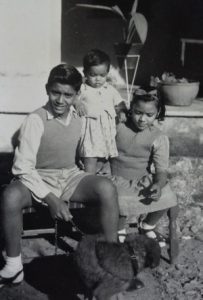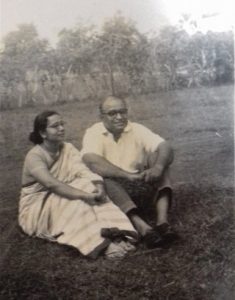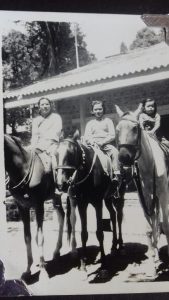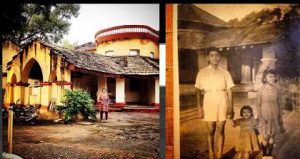My father was allotted a huge bungalow with a kitchen garden at the back and a small orchard with twenty mango trees and five to six guava trees. In the orchard were the servants’ quarters, as they were referred to in those days. In front was a garden full of flowers, succulents and cactuses.

I can still hear the chirping of birds and my father’s jeep honking to announce his return from work. Our dear Joseph Bhaiyya3 (my father’s orderly) would come running at jet speed to open the gate, and then would run back to the porch to wait for my father to get off the jeep, to carry his things to the house.

Now, my father had a reason for telling us to stay away from the platform, though he didn’t say it until long after we had left Jabalpur. The bungalow that was our home used to be an out- house of a local Muslim zamindar5 decades ago, where he was said to have been entertained by nautch girls. His son fell in love with one of the dancers, a Hindu; the enraged zamindar buried her alive. The platform was apparently built over her grave. There is no way of knowing if this is a true story, but many people believed it and said the house was cursed.
The zamindar sold the house to a group of Christian missionaries. They lived in the house until India’s independence in 1947 and then it was handed over to the army, who re quisitioned it to officers and their families.

I don’t know if the house was haunted or not, but life did throw us some trying times while we lived there. My sister would frequently suffer from high fever, accompanied by convulsions. It was frightening to see her having a fit, and I remember my brother getting very upset at the thought that she might die; people who worked for us would come running and try to revive her by getting her to smell a half-cut onion. It worked. We were advised to take her on a holiday to the hills which my parents did. When we returned we got to know that the person who took care of her called Pyari, had died in the quarters in our compound. My brother had a perennial stomach ailment, and my mother suffered from nervous breakdown, which traumatised us, especially my father.

I travelled to Jabalpur in 2014 with my family and went to see the house. I felt like I was visiting an old flame and wanted to say it like Wordsworth — Ah this is the house! It took us a while to find it though, for it has now been turned into a college. The garden and the flowers, which my father nurtured so lovingly, are all gone to make space for buildings. Half of the round verandah that fronted the house, has been turned into offices, and the badminton court has become a parking lot. The platform, of course, has been dismantled. But one glimpse at the spot, and all the memories came dancing back to my mind. The ghosts of my past are yet to be exorcised.
Retired Headmistress and an Educator, Urmi lives in Kolkata.
Footnotes
- A city in the central Indian province of Madhya Pradesh. It has a large cantonment that dates back to the 19th century
- A city in the northern province of Jammu and Kashmir. Due to its proximity to the border between India and Pakistan, the military station did not allow soldiers and officers to bring their families
- Bhaiyya, means older brother in Hindi. It is also used as an address
- A province in the south of India
- Landlord

Felt just the way it sounded when you would tell us different stories from your past, while we chatted. You are a natural narrator mashi.
Hi Tapti,
I read the wonderful piece by your sister (Urmi). Her writing has the ability to transport the reader into the setting, with vivid imagery.
John Neelankavil
I really enjoyed this story. Loved the writing and the metaphors.
Wonderfully written from the memory, based on pratical experiences.Ghosts or no ghosts, feelings of their presence is enough to evolve attractive stories.
Enjoyed reading it. Well written. It was really spooky in parts.
Oh, Urmi di, what a wonderful story! I can completely relate to this having had an itinerant childhood like yours, full of big old houses. Thank you for giving us all a glimpse of your childhood and your wonderful family.
Beautifully written piece. takes one back to one's childhood…